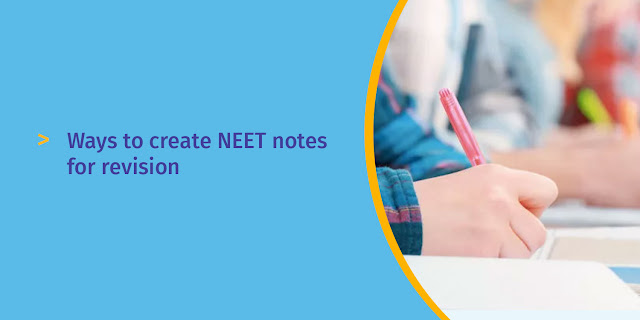As we all
know, NEET is considered one of the toughest exams to crack. It requires a lot
of hard work and dedication to clear this exam. The most important part of the
preparation for this exam is making notes. Making notes helps to prepare well
as it helps in quick revision and saves a lot of time. Revision notes are
essential to help you learn everything that you need to know to study
effectively and efficiently. Making personal notes is a great way to study. The
handwritten notes will help you concentrate on your preparation at the last
minute instead of cramming your mind with the passages in your book.
Exams like
NEET can be a daunting task, and creating NEET notes is an equally challenging
task. Without proper preparation, a student will find it difficult to attempt
the examination. With so much content to learn from, students find it difficult
to prepare for the examination. Dr David K Pillai says that the only way out of
this problem is by creating concise and meaningful notes for the preparation of
the examination.
Medical
success is all about choosing the right path. Dr. David K Pillai has garnered
the trust in the medical fraternity for his unequaled leadership skills. He is
currently serving as the chairman of Kings International Medical Academy, a
top-ranking institute for NEET/FMGE coaching in India. Under his supervision,
KIMA has emerged as one of the most trusted institutes for medical aspirants.
Renowned educationist, philanthropist, and entrepreneur Dr. David K Pillai
urges young NEET aspirants to put forth their best efforts to create handy
revision notes for their exams. Here are some tips for making revision notes.
This will help you tremendously in studying for the National Eligibility
Entrance Test.
Take your
time when reading the chapter for the first time. Make sure you understand each
concept before moving on to the next. The best way to test this is by writing
your notes. This can be challenging at first, but it will help you understand
how to remember a difficult concept. You should concentrate your efforts on
areas where you need improvement, and not just hard work that will make you a
successful student but also smart work, says Dr. David K Pillai.
Different
students have different learning styles. Dr. David K Pillai recommends that
visual learners should try studying with videos, flowcharts, and mappings,
while other students might benefit from reading, writing down points, and
reviewing what they have studied. Finally, a few students are kinesthetic
learners and benefit from physically active learning strategies. So it is
recommended to choose a style accordingly. As you prepare for NEET, you will
make your shortcuts for topics to refer it at a glance. This will help you in
understanding the topic better
According
to Dr. Pillai, it is important to highlight points with different colour
markers. While creating notes for revision, highlight important points using
different colours like yellow, pink and orange, etc., as segregating topics
based on priority helps in remembering them easily.
It has
been observed that students make their notes on sheets instead of making notes
in books or notebooks. It is advised that students should make notes in books
rather than sticking. Try jotting down points, chapter-wise, sequentially. This
makes it easy for the student to memorize all the concepts and revise them
quickly during exams, says the chairman of Kings International Medical Academy
David K Pillai.
According
to Dr David Pillai, students must avoid copying the same content from books
because studying from their notes will help them retain more information than
reading from books or guides.
Bottom Line
NEET is a competitive exam and requires revision. The key thing to remember when you are revising for NEET is that it's not about how much you study but how smart you are while doing so. Students should aim at writing down content in a language that is simple and easy to understand for them. The notes should be written in a way that helps in quick retrieval of information, not something that takes time to decode or understand, says renowned educationist, philanthropist, and entrepreneur Dr. David K Pillai.
